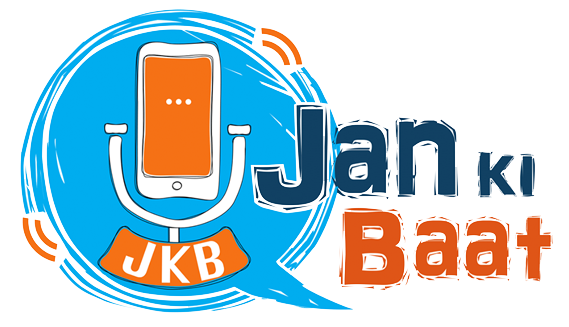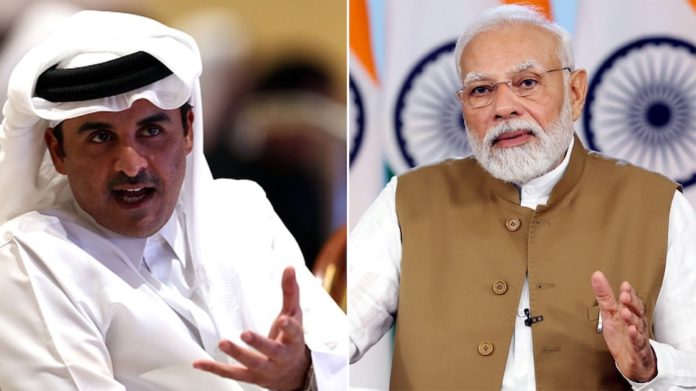Sagarika Mitra, Content Head of JAN KI BAAT explains the case in detail
In a shocking turn of events, eight former Indian Navy personnel who were arrested by Qatari authorities on August 30, 2022 – have now been sentenced to death. These men, with distinguished careers in the Indian Navy, are embroiled in a legal ordeal that has garnered international attention. Their sentencing has put India’s diplomatic relationship with Qatar under the spotlight.
Who Are the Ex Indian Navy Personnel?
The eight former Indian Navy personnel sentenced to death in Qatar are:
1. Captain Navtej Singh Gill
2. Captain Saurabh Vasisht
3. Commander Purnendu Tiwari
4. Captain Birendra Kumar Verma
5. Commander Sugunakar Pakala
6. Commander Sanjeev Gupta
7. Commander Amit Nagpal
8. Sailor Ragesh
They had distinguished careers in the Indian Navy, including serving as commanders of warships. As per a report in NDTV, they served in the Indian Naval force for over a decade and had held important positions including that of instructors in the force.
Their profiles paint a picture of exceptional dedication and service to the Indian Navy. Captain Navtej Gill, a distinguished officer, who was not only awarded the President’s gold medal for his excellence during his naval academy training but also served as an instructor at the prestigious Defence Services Staff College (DSSC) in Tamil Nadu. Another remarkable navy officer is Commander Purnendu Tiwari (retd), who commanded the amphibious warship INS Magar and received the Pravasi Bharatiya Samman Award in 2019 for his contribution to enhancing India’s image abroad, particularly in capacity building for the Qatar Emiri Naval Forces.
The eight former Indian Navy personnel who received the death penalty have been lauded for their outstanding professionalism and service to the nation. Their collective expertise spanned various domains, from communication and electronic warfare to gunnery, navigation, and direction.
What were ex Indian navy personnel doing in Qatar?
All eight former Indian Navy personnel found themselves in trouble while working at Al Dahra Global Technologies and Consultancy Services, a prominent defense services provider based in Doha. The company provided crucial training and services to Qatar’s armed forces. Dahra Global Technologies and Consulting Services played a pivotal role in advising on a Qatari initiative aimed at acquiring high-tech Italian-made submarines renowned for their radar-evading capabilities. As per several media reports, the ex Navy men were tasked with overseeing the induction of advanced Italian U212 stealth submarines into the Qatari Emiri Naval Force (QENF).
These men had dedicated four to six years of their careers to the company, accumulating invaluable expertise in their roles.
Why is this company shrouded in mystery?
Al Dahra Global Technologies and Consultancy Services is helmed by Khamis al-Ajmi, an Omani national and a retired squadron leader of the Royal Oman Air Force. Intriguingly, al-Ajmi found himself arrested alongside the eight Indian personnel but was released in November, 2022 – adding a layer of intrigue to the situation.
The company’s online presence raises suspicion about its activities; its old website, now defunct, touted its services, including training, logistics, and maintenance, to the Qatari Emiri Naval Force (QENF). In its current iteration as Dahra Global, there’s no mention of its association with QENF or the arrested former Indian Navy officers who once held pivotal positions within the organization.
Notably, the previous website displayed certificates of recognition from R Kumaran, former Indian envoy, underscoring the company’s role in fostering goodwill between India and Qatar.
In a significant development, on May 30, 2023 – Dahra Global ceased operations in Doha, prompting the majority of its employees to return to their homeland. It’s been reported that as many as 75 Indian nationals were employed by the company, with a significant portion hailing from Navy backgrounds.
What are the charges against former Indian Navy officers in Qatar?
While Qatari authorities have not made details of the case public, the fact that they were placed in solitary confinement fueled speculations that they might have been detained in connection with security-related offenses.
According to various reports, it is alleged that they were arrested on espionage charges. Their bail petitions were repeatedly denied. Sources in Qatar indicated that the former naval officers were suspected of spying on Qatar’s confidential submarine program on behalf of Israel. Despite their sentencing, they are expected to have the opportunity to appeal against their verdicts.
Sources indicate that Qatari authorities conveyed to Indian officials that there was evidence suggesting that these former officers had shared intelligence with Israel. The Qatari side further claimed to possess electronic evidence pertaining to this matter.
What did the Indian government do after their arrest?
In response to the arrest and subsequent legal proceedings involving the eight former Indian Navy personnel in Qatar, the Indian government actively engaged with authorities there and raised the issue at multiple levels. The trial unfolded over an extended period, lasting for 211 days, while the former Navy men spent 575 days in custody, before being sentenced. These proceedings included more than seven hearings in Qatar’s ‘court of first instance.’
The Indian Embassy first learnt about the arrests in mid-September last year – at least 2 weeks after their arrest. On September 30, 2022 the men were allowed ‘brief telephonic contact’ with their family members.
Notably, they were held in solitary confinement following their arrest in August of the previous year, with the trial officially commencing on March 29, 2023. A pivotal moment occurred on October 3, 2023, when the seventh hearing took place, just 23 days prior to the issuance of the death penalty.
India’s ambassador to Qatar and the deputy head of the mission met with the former naval officers on October 1, 2022. Ministry of External Affairs (MEA) played a central role, closely monitoring the situation and providing extensive support to the arrested individuals.
In December 2022, External Affairs Minister S. Jaishankar emphasized the sensitivity of the case in Parliament, assuring MPs that the detained former Indian Navy officers were a top priority for the government. He affirmed that ambassadors and senior officials maintained continuous communication with the Qatari government to ensure their welfare.
What next in this case?
As the legal saga surrounding the eight former Indian Navy personnel in Qatar unfolds, the Indian government finds itself navigating a complex web of international laws and diplomatic considerations.
Reports indicate that there exists an agreement between India and Qatar concerning the transfer of convicted prisoners. This arrangement enables individuals to serve their sentences in locations where their families can visit. However, the gravity of the situation, marked by the imposition of the death penalty on the ex Indian Navy officers, has sparked profound concerns and heightened diplomatic efforts on India’s part.
Amid this challenging landscape, a glimmer of hope emerges as the families of the detained Indian men have submitted a mercy plea to the Emir of Qatar, as reported by The Indian Express. Qatar’s legal framework permits the Emir to pardon convicts during significant occasions such as Ramadan, Eid, and Qatar’s National Day, which falls on December 18.
Can India take a Canada like stance with Qatar?
The complexities of international relations often belie simplistic reactions, particularly when dealing with nations intertwined in a web of influence, motives, and strategic alliances. In the case of India and Qatar, where over 8 lakh Indians work and Qatar ranks as the 7th largest exporter of oil to India, the stakes are high. Moreover, Qatar enjoys a strategic partnership with the United States, being designated as a major non-NATO ally.
In stark contrast to the Nijjar episode involving Canada, where India’s actions were driven by clear-cut reasons, the situation with Qatar is markedly different.
In international relations, the timing and context of any action can be pivotal. Abrupt decisions can risk strained relations and unpredictable consequences. The India-Qatar dynamic exemplifies how the interplay of geopolitics, economic interests, and strategic alliances requires a nuanced approach.
Recent hiccups in India – Qatar ties
Qatar’s recent actions have drawn scrutiny and have been seen as a contradiction in its diplomatic stance. Tensions flared when BJP spokesperson Nupur Sharma made remarks concerning Prophet Muhammad on a television program. Remarkably, Qatar was the first country to raise objections and demand a public apology from India. The Indian government acted swiftly to mitigate the fallout of this controversy.
Qatar’s approach to certain individuals and groups has indeed been a subject of criticism. In recent years, it has faced criticism for hosting figures like Zakir Naik, who has been accused of promoting extremist views. Additionally, the presence of various individuals with affiliations to groups like the Taliban and Hamas in Qatar has raised concerns among some nations. Even regional neighbors like Saudi Arabia and the UAE have expressed apprehension about Qatar’s policies. This has led to deep distrust and has ignited debates about Qatar’s role in fostering or tolerating extremism and providing a sanctuary for individuals and groups with controversial affiliations.
Questions that emerge around Qatar’s action
1. Could the timing of Qatar’s accusations against the Indian former navy officers, alleging espionage for Israel, be related to India’s evolving stance on the Israel-Palestine conflict and its open support for Israel?
2. How might Qatar’s actions be perceived in light of India’s condemnation of Hamas’s attack on the Israeli kibbutz and its maintenance of the two-state solution as its position in the Israel-Palestine conflict?
3. Is there a possibility that Qatar aims to disrupt the Abraham Accords between the UAE and Israel, as well as Saudi Arabia’s potential involvement, and India’s growing alignment with this emerging Israel-UAE-Saudi axis?
4. How does Qatar view India’s participation in the India-Middle East-Europe economic corridor and its exclusion of certain nations, and how might this influence its actions?
5. Could the allegations of Indian espionage for Israel and the imposition of the death penalty be tactics by Qatar to encourage India to reopen avenues for Islamist funding from the Gulf, particularly through NGOs and charities, given India’s recent clampdown on such funding?

